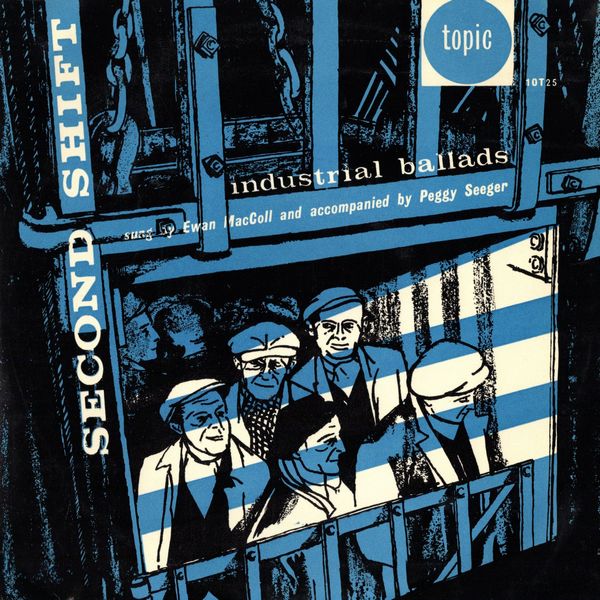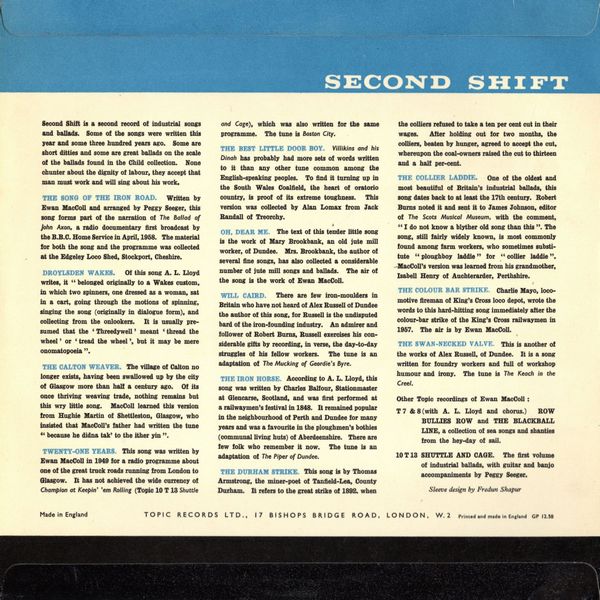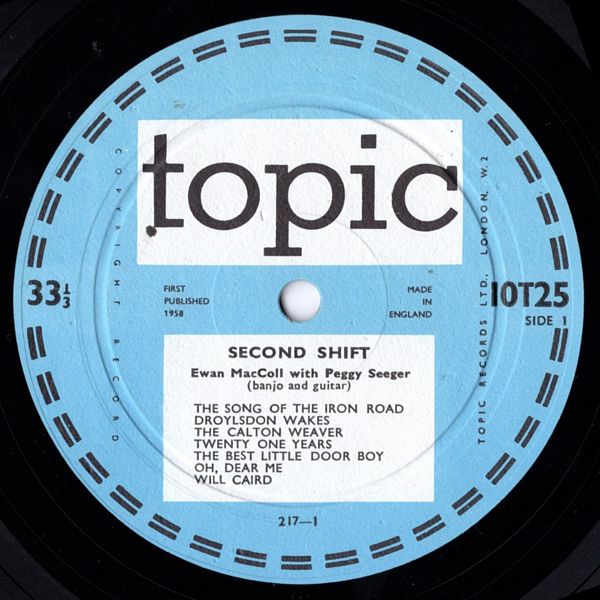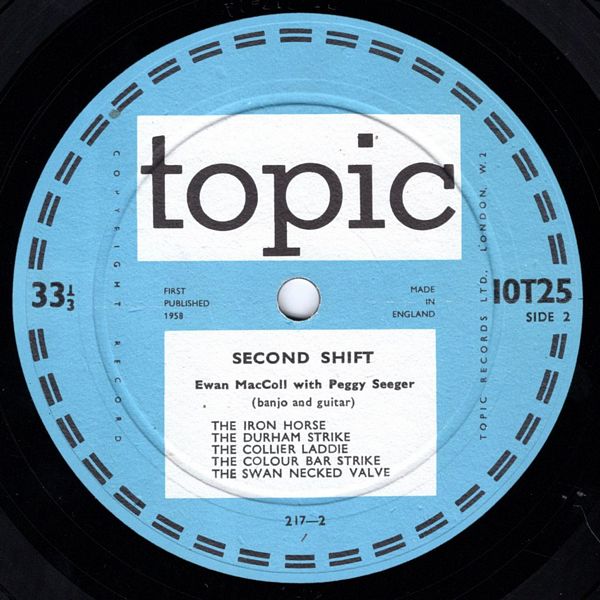


|



|
Sleeve Notes
Second Shift is a second record of industrial songs and ballads. Some of the songs were written this year and some three hundred years ago. Some are short ditties and some are great ballads on the scale of the ballads found in the Child collection. None chunter about the dignity of labour, they accept that man must work and will sing about his work.
THE SONG OF THE IRON ROAD — Written by Ewan MacColl and arranged by Peggy Seeger, This song forms part of the narration of The Ballad of John Axon, a radio documentary first broadcast by the B.B.C. Home Service in April, 1958. The material for both the song and the programme was collected at the Edgeley Loco Shed, Stockport, Cheshire.
DROYLSDEN WAKES — Of this song A. L. Lloyd writes, it "belonged originally to a Wakes custom, in which two spinners, one dressed as a woman, sat in a cart, going through the motion of spinning, singing the song (originally in dialogue form), and collecting from the onlookers. It is usually presumed that the 'Threedywell' meant 'Thread the wheel' or 'tread the wheel', but it may be mere onomatopoeia.
THE CALTON WEAVER — The village of Calton no longer exists, having been swallowed up by the city of Glasgow more than half a century ago. Of its once thriving weaving trade, nothing remains but this wry little song. MacColl learned this version from Hughie Martin of Shettleston, Glasgow, who insisted that MacColl's father had written the tune "because he didna tak' to the ither yin".
TWENTY-ONE YEARS — This song was written by Ewan MacColl in 1949 for a radio programme about one of the great truck roads running from London to Glasgow. It has not achieved the wide currency of Champion at Keepin' 'em Rolling (Topic 10 T 13 Shuttle and Cage), which was also written for the same programme. The tune is Boston City.
THE BEST LITTLE DOOR BOY — Villikins and his Dinah has probably had more sets of words written to it than any other tune common among the English-speaking peoples. To find it turning up in the South Wales Coalfield, the heart of oratorio country, is proof of its extreme toughness. This version was collected by Alan Lomax from Jack Randall of Treorchy.
OH DEAR ME — The text of this tender little song is the work of Mary Brookbank, an old jute mill worker, of Dundee. Mrs. Brookbank, the author of several fine songs, has also collected a considerable number of jute mill songs and ballads. The air of the song is the work of Ewan MacColl.
WILL CAIRN — There are few iron-moulders in Britain who have not heard of Alex Russell of Dundee, the author of this song, for Russell is the undisputed bard of the iron-founding industry. An admirer and follower of Robert Burns, Russell exercises his considerable gifts by recording, in verse, the day-to-day struggles of his fellow workers. The tune is an adaptation of The Mucking of Geordie's Byre.
THE IRON HORSE — According to A. L. Lloyd, this song was written by Charles Balfour, Stationrnaster at Glencarse, Scotland, and was first performed at a railwaymen's festival in 1848. It remained popular in the neighbourhood of Perth and Dundee for many years and was a favourite in the ploughmen's bothies (comrnunal living huts) of Aberdeenshire. There are few folk who remember it now. The tune is an adaptation of The Piper of Dundee.
THE DURHAM STRIKE — This song is by Thomas Armstrong, the miner-poet of Tanfield-Lea, County Durham. It refers to the great strike of 1892 when the colliers refused to take a ten per cent cut in their wages. After holding out for two months, the colliers, beaten by hunger, agreed to accept the cut, whereupon the coal-owners raised the cut to thirteen and a half per cent.
THE COLLIER LADDIE — One of the oldest and most beautiful of Britain's industrial ballads, this song dates back to at least the l7th century. Robert Burns noted it and sent it to James Johnson, editor of The Scots Musical Museum, with the comment, "I do not know a blyther old song than this". The song, still fairly widely known, is most commonly found among farm workers, who sometimes substitute "ploughboy laddie" for "collier laddie". MacColl's version was learned from his grandmother, Isabell Hendry of Auchterarder, Perthshire.
THE COLOUR BAR STRIKE — Charlie Mayo, loco-motive fireman of King's Cross loco depot, wrote the words to this hard-hitting song immediately after the colour-bar strike of the King's Cross railwaymen in 1957. The air is by Ewan MacColl.
THE SWAN-NECKED VALVE — This is another of the works of Alex Russell, of Dundee. It is a song written for foundry workers and full of workshop humour and irony. The tune is The Keach in the Creel.